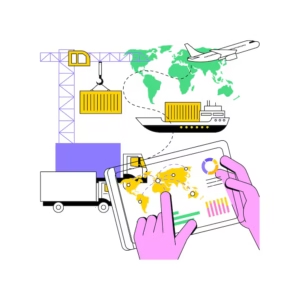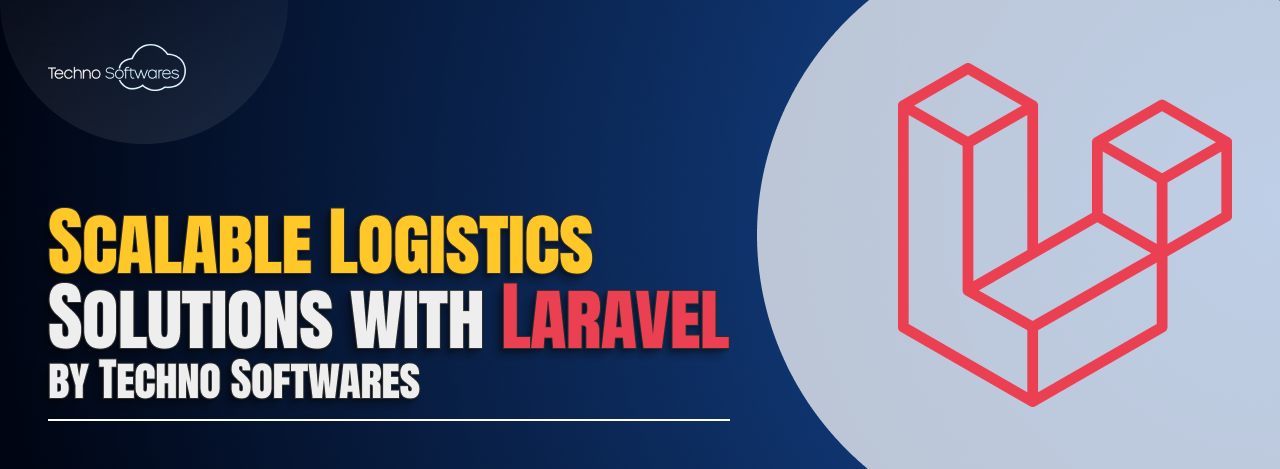Building Scalable Logistics Systems with Laravel: Techno Softwares’ Approach
In today’s fast-paced world, the logistics industry is undergoing a significant transformation. As businesses expand and customer expectations evolve, the need for scalable logistics systems has never been more critical. We find ourselves at a crossroads where traditional methods are no longer sufficient to meet the demands of modern supply chains.
The ability to adapt and grow is paramount, and this is where scalable logistics systems come into play. These systems not only streamline operations but also enhance efficiency, reduce costs, and improve customer satisfaction. As we delve deeper into the intricacies of building scalable logistics systems, we recognize that the foundation of such systems lies in robust technology.
The right technological framework can make all the difference in how effectively a logistics operation can scale. By leveraging advanced software solutions, we can create systems that are not only responsive to current needs but also flexible enough to accommodate future growth. This article will explore the role of Laravel, a powerful PHP framework, in developing these scalable logistics systems and how Techno Softwares is leading the charge in this domain.
Key Takeaways
- Building scalable logistics systems is crucial for the success of any logistics business.
- Laravel offers numerous benefits for logistics systems, including rapid development, robust security, and extensive customization options.
- Techno Softwares adopts a comprehensive approach to building scalable logistics systems with Laravel, focusing on efficiency, flexibility, and future scalability.
- Key features of Techno Softwares’ logistics systems include real-time tracking, route optimization, inventory management, and seamless integration with other systems.
- Case studies demonstrate the successful implementation of Techno Softwares’ logistics systems, resulting in improved efficiency, cost savings, and customer satisfaction.
Understanding Laravel and its Benefits for Logistics Systems
Laravel has emerged as a popular choice among developers for building web applications, and its advantages are particularly pronounced in the logistics sector. One of the primary benefits of Laravel is its elegant syntax, which allows us to write clean and maintainable code. This is crucial in logistics, where complex operations require clear and concise programming to ensure that systems function smoothly.
The framework’s built-in features, such as routing, authentication, and caching, enable us to develop comprehensive logistics solutions that can handle various operational challenges. Moreover, Laravel’s scalability is a significant asset for logistics systems. As our business grows, so do our operational demands.
Laravel’s architecture supports the development of applications that can easily scale horizontally or vertically, accommodating increased traffic and data without compromising performance. This flexibility allows us to respond swiftly to market changes and customer needs, ensuring that our logistics operations remain efficient and effective.
Techno Softwares’ Approach to Building Scalable Logistics Systems with Laravel

At Techno Softwares, we pride ourselves on our innovative approach to developing scalable logistics systems using Laravel. Our methodology begins with a thorough understanding of our clients’ unique requirements and challenges. By engaging in detailed discussions and assessments, we gather insights that inform our development process.
This client-centric approach ensures that the solutions we create are tailored to meet specific operational needs while remaining adaptable for future growth. Once we have a clear understanding of the requirements, we leverage Laravel’s robust features to build a system that integrates seamlessly with existing processes. Our team of experienced developers utilizes Laravel’s modular architecture to create components that can be easily modified or expanded as needed.
This not only enhances the system’s functionality but also allows for quicker updates and improvements over time. By prioritizing scalability from the outset, we ensure that our logistics systems can evolve alongside our clients’ businesses.
Key Features and Functionality of Techno Softwares’ Logistics Systems
The logistics systems developed by Techno Softwares are equipped with a range of key features designed to optimize operations and enhance user experience. One of the standout functionalities is real-time tracking and monitoring. This feature allows businesses to keep tabs on shipments at every stage of the supply chain, providing valuable insights into delivery times and potential delays.
By offering transparency to both businesses and customers, we help build trust and improve overall satisfaction. Another critical feature is the integration of advanced analytics tools. Our logistics systems harness data to provide actionable insights that drive decision-making.
By analyzing trends in shipping patterns, inventory levels, and customer preferences, businesses can make informed choices that enhance efficiency and reduce costs. Additionally, our systems support automated reporting, which saves time and resources while ensuring that stakeholders have access to essential information when they need it.
Case Studies: Successful Implementations of Techno Softwares’ Logistics Systems
To illustrate the effectiveness of our approach, we can look at several successful implementations of Techno Softwares’ logistics systems. One notable case involved a large e-commerce company struggling with order fulfillment delays due to outdated processes. By partnering with us, they were able to implement a custom logistics system built on Laravel that streamlined their operations significantly.
The new system provided real-time tracking capabilities and automated inventory management, resulting in a 30% reduction in delivery times and a marked increase in customer satisfaction. Another example is a regional distribution company that faced challenges in managing its fleet efficiently. We developed a tailored logistics solution that incorporated route optimization algorithms and vehicle tracking features.
This not only improved their delivery efficiency but also reduced fuel costs by 20%. The success of these implementations underscores our commitment to delivering scalable solutions that address specific business challenges while fostering growth.
Best Practices for Scaling Logistics Systems with Laravel
Modular Design for Optimal Functionality
As we continue to develop scalable logistics systems with Laravel, we have identified several best practices that can enhance the effectiveness of our solutions. First and foremost is the importance of modular design. By breaking down the system into smaller, manageable components, we can ensure that each part functions optimally while allowing for easy updates and scalability as needed.
Security and Performance Optimization
Another best practice involves leveraging Laravel’s built-in features for security and performance optimization. Implementing robust authentication protocols and data encryption measures is essential in protecting sensitive information within logistics operations.
Enhancing User Experience with Caching Mechanisms
Additionally, utilizing caching mechanisms can significantly improve system performance by reducing load times and enhancing user experience.
Future Trends and Innovations in Logistics Systems Development with Laravel
Looking ahead, we anticipate several trends and innovations that will shape the future of logistics systems development with Laravel. One such trend is the increasing integration of artificial intelligence (AI) and machine learning (ML) into logistics operations. These technologies can analyze vast amounts of data to predict demand patterns, optimize routes, and enhance inventory management processes.
As we embrace these advancements, we will be able to create even more intelligent logistics systems that adapt in real-time to changing conditions. Furthermore, the rise of Internet of Things (IoT) devices presents exciting opportunities for enhancing logistics systems. By incorporating IoT sensors into our solutions, we can provide real-time data on shipment conditions, vehicle performance, and inventory levels.
This level of connectivity will enable businesses to make proactive decisions that improve efficiency and reduce costs.
The Importance of Choosing the Right Development Partner for Scalable Logistics Systems
In conclusion, building scalable logistics systems is essential for businesses looking to thrive in an increasingly competitive landscape. The choice of technology plays a pivotal role in this process, and Laravel stands out as an ideal framework for developing robust solutions tailored to meet specific operational needs. At Techno Softwares, we understand the complexities involved in creating these systems and are committed to delivering innovative solutions that drive growth.
Choosing the right development partner is crucial for success in this endeavor. With our expertise in Laravel and our client-centric approach, we are well-equipped to help businesses navigate the challenges of scaling their logistics operations. As we continue to explore new technologies and methodologies, we remain dedicated to providing our clients with the tools they need to succeed in an ever-evolving industry landscape.
Together, we can build scalable logistics systems that not only meet today’s demands but also pave the way for future growth and innovation.
If you’re interested in enhancing your business’s technological capabilities further, consider exploring how integrating third-party APIs with Shopify can streamline your operations and improve customer experiences. Techno Softwares offers insights on this topic in their article, “Shopify Third-Party API Integration.” This piece could be particularly beneficial if you’re looking to expand the functionality of your e-commerce platform after setting up a scalable logistics system with Laravel. You can read more about it by visiting Shopify Third-Party API Integration. This guide provides valuable information on how to effectively incorporate various external services and tools into your Shopify store, which can lead to enhanced efficiency and increased sales.
FAQs
What is Laravel?
Laravel is a popular open-source PHP framework used for building web applications. It follows the model-view-controller (MVC) architectural pattern and provides a robust set of tools and features for web development.
What are scalable logistics systems?
Scalable logistics systems are software solutions designed to efficiently manage and optimize the flow of goods, services, and information throughout the supply chain. These systems are capable of handling increasing demands and adapting to the changing needs of a business.
How can Laravel be used to build scalable logistics systems?
Laravel can be used to build scalable logistics systems by leveraging its powerful features such as modular packaging, dependency injection, and built-in support for database management. Additionally, Laravel’s robust ecosystem of libraries and extensions allows developers to create flexible and scalable logistics solutions.
What is Techno Softwares’ approach to building scalable logistics systems with Laravel?
Techno Softwares’ approach to building scalable logistics systems with Laravel involves leveraging the framework’s features to create modular, flexible, and efficient solutions. This includes utilizing Laravel’s built-in tools for handling complex business logic, integrating with third-party APIs, and optimizing performance for large-scale operations.
What are the benefits of using Laravel for building scalable logistics systems?
Some benefits of using Laravel for building scalable logistics systems include rapid development, robust security features, seamless integration with third-party services, and the ability to handle high traffic and large datasets. Additionally, Laravel’s active community and extensive documentation make it a reliable choice for long-term support and maintenance.





